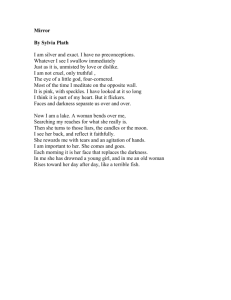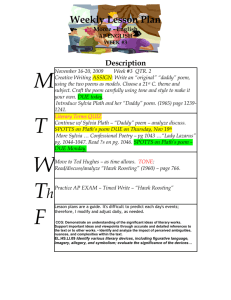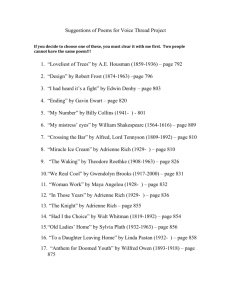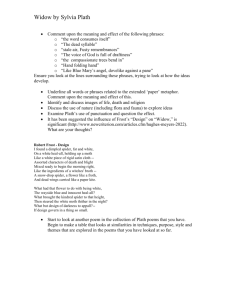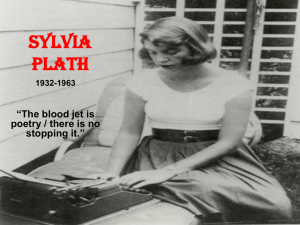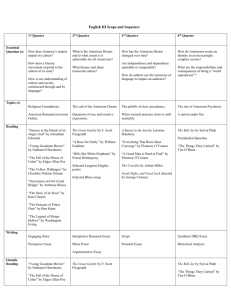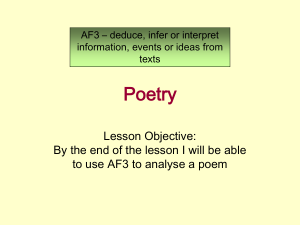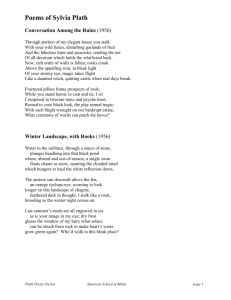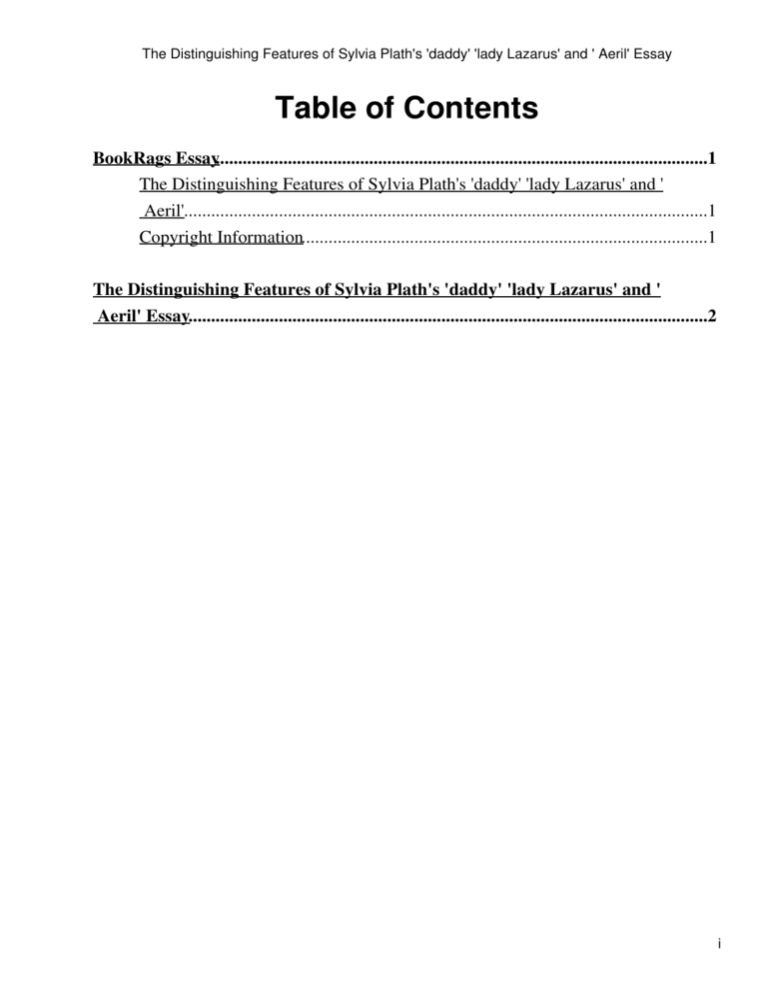
The Distinguishing Features of Sylvia Plath's 'daddy' 'lady Lazarus' and ' Aeril' Essay
Table of Contents
BookRags Essay.............................................................................................................1
The Distinguishing Features of Sylvia Plath's 'daddy' 'lady Lazarus' and '
Aeril'....................................................................................................................1
Copyright Information..........................................................................................1
The Distinguishing Features of Sylvia Plath's 'daddy' 'lady Lazarus' and '
Aeril' Essay...................................................................................................................2
i
BookRags Essay
The Distinguishing Features of Sylvia Plath's
'daddy' 'lady Lazarus' and ' Aeril'
For the online version of The Distinguishing Features of Sylvia Plath's 'daddy' 'lady
Lazarus' and ' Aeril' Essay, including complete copyright information, please visit:
http://www.bookrags.com/essay-2006/6/27/75625/9401/
Copyright Information
(c)2000-2006 BookRags, Inc. ALL RIGHTS RESERVED.
BookRags Essay
1
The Distinguishing Features of Sylvia
Plath's 'daddy' 'lady Lazarus' and ' Aeril'
Essay
Sylvia Plath's poetry takes a strong stance on the various aspects of power in the area
of gender relations. She takes on a unique approach to criticise and reject patriarchal
attitudes and values by using many distinguishing language and stylistic features. This
is evident in her poems `Daddy', `Lady Lazarus' and `Ariel' which all portray unique
representations of the issue of power in the area of gender relations.
A distinguishing feature of Plath's poetry is her confrontational and intense approach
to writing. Her poems portray abstract concepts through metaphors, and shocking
imagery to criticise patriarchal views and beliefs, while depicting the empowerment of
women.
One of the most distinguishing features of Plath's poetry is her unique use of extended
metaphors to link a narrative based poem to political statements. The most notorious
and controversial being the comparison between the atrocities of the Holocaust and the
disempowerment of women in a patriarchal society. `Daddy' and `Lady Lazarus' use
this metaphor extensively. By referring to men as `Nazis', Plath summons the mass of
negative connotations associated with the Nazis, and attaches them to men,
positioning the responder to see them as manipulating and evil. Plath also intensifies
this metaphor by frequently referring to herself, and females in general as `Jews' who
have historically been the target of Nazi aggression. Plath also uses this metaphor to
convey more abstract concepts. `Chuffing me off like a Jew. A Jew to Dachau,
Auschwitz, Belsen.' This depicts a dark image of how the Jews were stripped of their
identity and belongings and assigned nothing but a number before being sent to Nazi
concentration camps. Plath uses this metaphor to depict the loss of identity of a
woman in a patriarchal society, due to hegemony demanding that women become
submissive, incapable of thinking, acting or making decisions for themselves.
The Distinguishing Features of Sylvia Plath's 'daddy' 'lady Lazarus' and ' Aeril' Essay
2
The Distinguishing Features of Sylvia Plath's 'daddy' 'lady Lazarus' and ' Aeril' Essay
Plath also uses the Nazi metaphor to criticise the seemingly infinite power enforced
through hegemony has in a patriarchal society. `Not God but a swastika, So black no
sky could squeak through.' The swastika metaphorically represents hegemony. The
sky is a metaphor for personal expression, and `black' is a metaphor for the hold
hegemony has over society. The grip of hegemony is so strong that it doesn't allow
any room for individual opinions or personal expression.
Plath often uses emotionally charged, violent metaphors to make her point. `There's a
stake in your fat, black heart.' The vampire metaphor depicts patriarchal society as a
leech-like creature, which gains power by disempowering women. Plath also
expresses the need to stand up to her male oppressors by `putting a stake' through the
patriarchy's `fat, black heart.' The stake alludes to the gothic genre, which typically
depicts a `masculine hero' and a `damsel-in-distress'. This quote displays a reversal of
roles as the female rejects her `damsel in distress' image and becomes her own hero.
Ariel depicts her throwing off the restrictive culture of patriarchy and giving into
uninterrupted artistic expression. `Dead hands, dead stringencies.' These `hands'
metaphorically depicts the pressure from a patriarchal society to succumb to
conformity. The symbolic image of the hands stop her from what she wants to do,
grasping, restraining, suffocating her while directing her into conforming with a
preconceived set of ideas about a woman's identity. By pronouncing them dead she
makes a statement about her freedom from the constrictions of patriarchy. Sylvia Plath
uses this metaphor to make a statement about taking back power through
self-liberation.
Plath uses metaphors with sexual connotations to depict the power men have over
women sexually. She uses' The big striptease' in `Lady Lazarus', which the `peanut
crunching crowd' are eager to see, as a metaphor for the prying, perverted values in a
male dominated society thus, making a statement about how men see women as a
sexual object; as a sum of her reproductive parts.
The Distinguishing Features of Sylvia Plath's 'daddy' 'lady Lazarus' and ' Aeril' Essay
3
The Distinguishing Features of Sylvia Plath's 'daddy' 'lady Lazarus' and ' Aeril' Essay
Sylvia Plath writes her poems with a female perspective. Typically her poems have a
female persona, which portrays the experience of a female in a male dominated world.
The poems are usually one-sided in their view on patriarchal society, showing only the
negative aspects behind their attitudes towards women's positions within a patriarchal
society, therefore making a strong feminist statement. `Daddy', `Lady Lazarus' and
`Ariel' all use a first person perspective from the persona's point of view. The first
person point of view evokes a sympathetic response from the responder and adds to
the emotional impact of the text. Her poems generally position the responder as the
intended audience - the male oppressor. `Lady Lazarus' and `Daddy' achieve this by
using second person pronouns when referring to the male characters in the poems. By
using high modality accusations in second person, the reader is addressed as the
antagonist in the poems. This can evoke a shocked and shameful emotional response
and reveal the absurdity of the actions, which Plath uses to shake her intended
audience out of complacency with the hegemonic views of patriarchal society.
`Daddy, daddy, you bastard, I'm through.' This phrase evokes a feeling of pity from
the responder. The feeling of resignation in `I'm through' is intensified by the first
person pronouns and the second person accusation `you bastard', evokes a feeling of
pity and sympathy.
The unique diction is quite a significant and distinguishing feature in Plath's poems,
influencing her representation of power in the area of gender relations. `Daddy' uses a
unique diction to depict a feeling of frustration. A unique method used, is the
occasional use of children's discourse with words like `Daddy', `Achoo' and
`gobbledygoo'. In doing this, the persona is portrayed as having a child-like innocence.
By portraying the persona as a child, Plath justifies the seemingly exaggerated
accusations in the poems by depicting them as products of the irrationality of a
grieving child's mind. `Daddy' also uses many words either in German or associated
with Germans or Nazis. Plath uses this to link the negative connotations of the Nazis
to men thus portraying them as sadistic, controlling and manipulating.
`Lady Lazarus' is a bitter poem filled with irony and sarcasm. `Do not think I
underestimate your great concern.' This quote is sarcastic, conveying the complete
The Distinguishing Features of Sylvia Plath's 'daddy' 'lady Lazarus' and ' Aeril' Essay
4
The Distinguishing Features of Sylvia Plath's 'daddy' 'lady Lazarus' and ' Aeril' Essay
opposite of what it says. Plath does this to criticise the lack of real concern of men
about women. `My face a featureless, fine Jew linen.' By referring to the face as `Jew
linen' the persona is objectified as a fine possession if a man, which is kept for its
aesthetic appeal. This is further emphasized by the clever choice of adjectives.
`Featureless, fine' the woman is expected to be featureless and not have any opinions,
needs or wants while being `fine' by putting on a happy and pretty façade for the
outside world.
`Ariel' is a very vague poem, and its diction is heavily based on metonyms. `Berries
cast dark, ---- Hooks' Plath includes small details, but deliberately avoids an obvious
storyline. This is to prompt the responder into completing the picture themselves,
creating a subjective and personal connection. By doing this, Plath can evoke
emotional responses from the poem `Something else, Hauls me through air -Thighs,
hair' these lines are the emotive climax of the poem and evoke a carefree, empowering
feeling which is emphasised by the metonyms.
Sylvia Plath's poetry has many distinguishing features, which together make up her
unique writing style. Her poems use these distinguishing features to great extent to
criticise the inequality of power in gender relations.
The Distinguishing Features of Sylvia Plath's 'daddy' 'lady Lazarus' and ' Aeril' Essay
5

